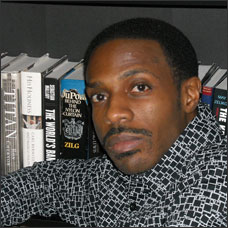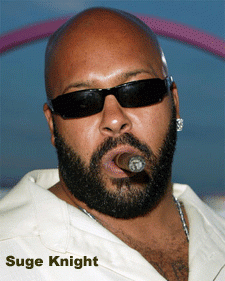Here’s an interesting article dealing w/ growing skepticism of the Source magazine, Hip Hop and Race..
Eminem
It was a press conference called by a high-profile congresswoman, the founder of a magazine once considered “the Bible of hip-hop” and a respected Los Angeles community activist. The goal: to tackle issues of racism in the music industry and to announce a plan “to reclaim ownership of hip-hop for the African American community.”
On the podium in Beverly Hills on Friday were Rep. Maxine Waters (D-Los Angeles), Source magazine founder David Mays and activist Aqueela Sherills, who helped broker a 1992 truce between rival gangs in Watts. Presidential candidate the Rev. Al Sharpton even put in a surprise appearance.
The participants decried what they characterized as a deliberate effort by the music industry “to redefine and repackage hip-hop for mainstream America” and outlined plans for a national peace campaign with a series of hip-hop festivals aimed at reinfusing money generated by rap music back into communities where it was born.
But there was also an elephant in the room, one that all on hand did their best to ignore: the ongoing feud between the Source and the world’s most popular rapper, Eminem, who is white.
Following a presentation that ran more than an hour, Mays, who is also white, called for questions from the press, but the Q&A session wrapped in less than five minutes. There were barely half a dozen reporters in the 150-seat ballroom.
The light turnout appeared to reflect increasing media skepticism toward the Source since the publication launched a series of attacks last year against Eminem.
Just as the magazine has assailed his character and integrity in the world of hip-hop, the mainstream press has been asking the same things about the Source. In its Jan. 12 issue, Time magazine writes that “outrage has boomeranged on the questionable journalistic judgment of Mays and the Source.”
The public skirmish began in the Source’s February 2003 issue, which included an article critical of Eminem and an illustration of rapper Benzino holding the Detroit rapper’s severed head. Benzino, whose real name is Raymond Scott, is Mays’ business partner.
The attacks escalate in the Source’s February issue, which hit stands last week — with Eminem on the cover. Several articles again paint him as a racist and a culture thief, a white kid who has profited enormously, and unfairly, from an art form created by blacks.
The magazine comes with a CD containing excerpts of a tape Eminem made at least a decade ago in which he denigrated black women.
The Source, which made the tape public in November, argues that the comments refute Eminem’s long-espoused position that he respects the black culture that gave birth to rap and fueled his career.
Eminem issued a short statement at the time apologizing, saying it was “something I made out of anger, stupidity and frustration when I was a teenager.”
The Source frames its questions about Eminem as symbolic of a pervasive racism threatening hip-hop music today, a problem Friday’s press conference tried to address.
“That debate [over Eminem] is necessary to force the discussion to the next level,” Mays said after the conference. “There’s no question Eminem is a powerful force. As a leader, he has a tremendous influence…. As painful as it might be, we’ve got to deal with the issue of racism.”
Yet many in the music press view the situation simply as mudslinging by Benzino and Mays.
Benzino
Benzino’s role at the Source has been a point of contention before, prompting wholesale resignations of its editorial staff twice when the rapper, described by Village Voice music critic Robert Christgau as “an obvious second- or fourth-rater,” received glowing coverage in the magazine of which he’s “co-founder and chief brand executive.” The February issue has a cover reference to more Benzino coverage.
“There are issues worth debating about Eminem’s rise — the rise of a white figure to the top of the hip-hop game — and how it reflects racial attitudes in America,” says Craig Marks, editor in chief of Blender magazine, which covers rock, pop and hip-hop. “Unfortunately, the Source may not be the best-qualified magazine to lay those out.”
The Source’s discussion of racism and hip-hop, says Chuck Eddy, music editor at the Village Voice, is “completely colored by the feud” between the magazine and the rapper. “We haven’t done a piece on it, and we don’t plan to.”
The magazine’s new issue also charges Eminem, who has been widely embraced not only by Anglos but by black, Latino and Asian fans and other hip-hop artists, with using phrases derogatory to all African Americans. These are based on comments from a former associate, and this time the magazine has offered no audio clips as proof.
“We don’t have any further response to the Source,” a spokesman for Interscope Records, Eminem’s label, said last week. “We’re out of business with them.” Eminem, whose real name is Marshall Mathers, gave an exclusive interview to XXL magazine, the Source’s chief competitor, which will appear in its March issue, arriving on newsstands next month.
“I don’t think anyone around me is questioning where my heart is at,” he tells XXL, which once attacked his credibility because he is white. “I know what I do is black music. I know how it started, I know where it came from. But instead of trying to solely capitalize off it, I’ve been able to get in a position where I’m able to help other people.”
Editor in chief Elliott Wilson said XXL let Eminem address its rival’s questions about his racial attitudes because “despite the fact that you may not be able to trust the messenger [the Source], if an African American kid who’s an Eminem fan has heard that he used the N-word, he deserves answers.”
Dave Mays
On Friday, some participants tried to draw a line between the Eminem debate and the discussion of ways to incorporate hip-hop music and performers into a broad campaign to reduce violence in inner cities and to channel the music’s economic power toward the improvement of those communities.
Mays pondered the question of whether the Source’s focus on Eminem might undermine efforts to promote meaningful debate on the wider issue of who deserves to reap the rewards of hip-hop’s transformation from a street art form to an international cultural phenomenon.
“He’s up there. He’s the tool being used by the corporations,” Mays said.
As to whether targeting Eminem will do more harm than good in the long run, “that,” Mays said, “remains to be seen.”
Randy Lewis, Times Staff Writer




 Last week was a bad week we had 2 deaths and one near death with Beenie Man needing surgery to repair a punctured lung and 2 broken ribs sustained in an early morning car accident in Kingston, Jamaica. Then we had the passing of Ron O’Neal aka Superfly who died Wednesday at Cedars Sinai Medical Center in Los Angeles after a long battle with cancer. He was 66.Dr. Barashango, a fiery and profound scholar passed on in Philadelphia,Pennsylvania. Dr. Barashango wrote many powerful books his most popular work was African People & European Holidays: A Mental Genocide. So 2 minutes of silence.Speaking of 2 minute warnings, Beyonce Knowles will sing the national anthem at the Super Bowl in
Last week was a bad week we had 2 deaths and one near death with Beenie Man needing surgery to repair a punctured lung and 2 broken ribs sustained in an early morning car accident in Kingston, Jamaica. Then we had the passing of Ron O’Neal aka Superfly who died Wednesday at Cedars Sinai Medical Center in Los Angeles after a long battle with cancer. He was 66.Dr. Barashango, a fiery and profound scholar passed on in Philadelphia,Pennsylvania. Dr. Barashango wrote many powerful books his most popular work was African People & European Holidays: A Mental Genocide. So 2 minutes of silence.Speaking of 2 minute warnings, Beyonce Knowles will sing the national anthem at the Super Bowl in











